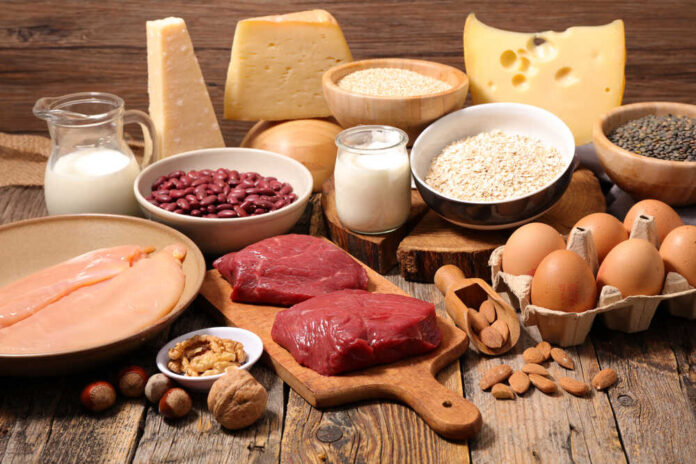
Protein plays a crucial role in our overall health, providing the building blocks for muscle, skin, hair, and other tissues. It is also essential for the production of enzymes, hormones, and neurotransmitters.
To ensure we meet our body’s protein requirements, the Recommended Dietary Allowance (RDA) is set at 0.8 grams of protein per kilogram of body weight per day for adults. For most people, this will be between 50 and 80 grams of protein per day.
But, your body appears to be somewhat limited in how much protein it can digest and absorb in one sitting—you may need to spread your intake out throughout the day.
Protein Digestion and Absorption
Protein digestion begins in the stomach, where hydrochloric acid and pepsin break down proteins into smaller chains called polypeptides. The process continues in the small intestine, where enzymes called proteases further break down polypeptides into smaller units called amino acids.
These amino acids are then absorbed into the bloodstream through specialized cells lining the intestine. The amino acids can then be resynthesized into new proteins for your body to use.
Factors Affecting Protein Absorption
Various factors can influence the rate and efficiency of protein absorption in the body. These include:
- Protein source: Different protein sources are absorbed at different rates. For example, whey protein is absorbed rapidly, while casein is absorbed more slowly. The absorption rate of plant-based proteins can also vary depending on factors such as fiber content and the presence of anti-nutrients.
- Protein quality: The quality of the protein source can impact absorption. High-quality proteins, which contain all nine essential amino acids in adequate amounts, are more efficiently absorbed than lower-quality proteins.
- Meal composition: The presence of other macronutrients, such as carbohydrates and fats, can slow down gastric emptying and affect the rate at which protein is absorbed.
- Age and muscle mass: Older individuals and those with greater muscle mass may have different protein requirements and absorption capabilities compared to younger, less muscular individuals.
- Exercise: Physical activity can increase the body’s need for protein and improve its efficiency in utilizing amino acids for muscle repair and growth.
The Myth of the 30-Gram Limit
A common belief circulating in the fitness and nutrition world is that the human body can only digest and absorb about 30 grams of protein per meal. This idea likely stems from early research on muscle protein synthesis (MPS), which suggested that consuming more than 30 grams of protein in a single sitting did not result in significantly higher rates of MPS.
However, more recent research has challenged this notion. Studies have shown that while MPS may plateau after consuming a certain amount of protein, the body continues to digest and absorb additional protein, using the amino acids for other functions like energy production or the synthesis of other proteins.
Optimizing Protein Intake For Muscle-Building
Here are a few actionable tips to help you optimize your protein intake for muscle-building:
- Distribute protein intake evenly: Aim to consume 0.4 g of protein per kg of body weight per meal, spread across at least four meals daily. For example, a 70 kg individual should consume approximately 28 grams of protein per meal.
- Choose high-quality protein sources: Include a variety of high-quality, complete protein sources in your diet, such as lean meats, poultry, fish, dairy, eggs, and plant-based options like soy, quinoa, and legumes.
- Combine fast and slow-digesting proteins: Incorporate both fast-digesting proteins, like whey, and slow-digesting proteins, like casein, in your diet. This combination can optimize amino acid absorption and muscle protein synthesis.
- Consider protein timing around workouts: While the overall daily protein intake is most important, consuming a high-quality protein source soon after resistance training may provide additional benefits for muscle growth and recovery.
- Don’t forget about other macronutrients: A well-rounded diet that includes carbohydrates and healthy fats is essential for overall health and athletic performance. Carbohydrates help replenish glycogen stores, while healthy fats support hormone production and nutrient absorption.
- Monitor your progress and adjust as needed: Track your protein intake, muscle growth, and overall progress. Adjust your protein consumption, workout regimen, or other factors as needed to continue making progress toward your goals.
By incorporating these evidence-based recommendations into your nutrition plan and workout routine, you can make informed decisions about your protein intake and maximize your muscle-building potential.






















